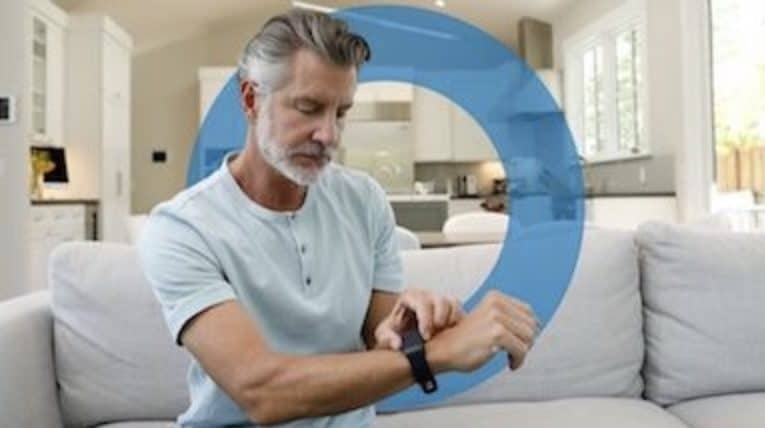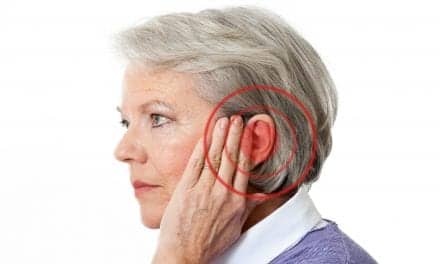Study reveals that a wearable tinnitus device created by Neosensory significantly reduces a person’s severity of symptoms
Neosensory, a technology company designing solutions for hearing impairments, has published new results in their recent scientific study of Duo, their therapeutic intervention for tinnitus (ringing in the ears). The group of participants who used Neosensory’s Duo solution daily for eight weeks reported clinically significant reduction in their tinnitus severity. The paper has just been published in the International Tinnitus Journal: Bimodal stimulation for the reduction of tinnitus using vibration on the skin.
The changes in tinnitus severity were measured using the Tinnitus Functional Index, the most widely adopted method of assessing tinnitus. A decrease in the Tinnitus Functional Index score of greater than 13 points indicates a reduction in tinnitus symptoms that is clinically significant and impactful on one’s quality of daily life. The current study showed Neosensory’s Duo solution produced an average score reduction of 22 points for people who started the study with moderate to severe tinnitus. Seven of the participants in the group that used Neosensory’s wristband experienced a reduction in their Tinnitus Functional Index score of greater than 30 points.
Neosensory’s program uses a patented wristband to create specific vibrational patterns on the skin, synchronized with a set of tones played in a frequency range individualized to the user’s tinnitus. The effectiveness of using two input streams (known as bimodal stimulation) for tinnitus sufferers has been previously demonstrated in large clinical studies conducted by separate teams at the University of Michigan and Trinity College, Dublin. Both those studies used electrical shocks on the tongue combined with variations of tones, a technique which requires specialized equipment in an audiologist’s office. In contrast, the Neosensory approach only requires a specialized wristband which is mailed to the participants’ home.
In the recent study, a control group listened to the same auditory tones, but with no wristband (and hence no accompanying vibrations). The control group with moderate or severe tinnitus showed an average reduction of just 4.6 points – a modest change not considered large enough to reflect a meaningful improvement in quality of daily life. The group with the wristband showed improvements almost 5 times greater.
“This science opens the door to tinnitus relief which doesn’t otherwise exist,” said David Eagleman, Neosensory’s CEO. “While there is no total cure for tinnitus, we have found that just 10 minutes of wearing the wristband each day can drive tinnitus down by about a third in most people.”
Izzy Kohler, Lead Scientist at Neosensory and co-author of the study, added “This device is one of the most effective treatments for tinnitus available, and it will change lives. I am very proud of what the team at Neosensory has accomplished through hard work, dedication, and scientific ingenuity.”
Tinnitus is the perception of sound in the absence of actual auditory stimulation. Those with the condition describe the sounds and symptoms they hear in a variety of ways, including ringing, buzzing, whistling, swooshing or clicking. According to the American Tinnitus Association (ATA), nearly 50 million Americans have experienced some form of tinnitus, with as many as 20 million experiencing a debilitating case.
Duo is a breakthrough tinnitus solution designed by Neosensory, a California-based company known for developing products that combine neuroscience with specialized wearables to assist people with hearing impairments.
Earlier this year, Neosensory also launched Clarify, a ground-breaking solution for helping those with hearing loss to understand speech. Clarify is the first alternative to hearing aids and sound amplifiers on the market in a generation. The Clarify program is administered through the same wristband technology as Duo. When in Clarify mode, the wristband detects high-frequency parts of speech and vibrates in intentional patterns to indicate sounds that people with hearing loss have difficulty deciphering on their own. The vibrations are interpreted by users who, with practice, build an understanding of how to combine the audio signals from the ear with the vibrational signals on their wrist. This process begins immediately within the user’s brain, and in a matter of weeks, a new sense is born. All Clarify users can access the Duo program for free, and vice-versa.
Source: Neosensory
Images:





